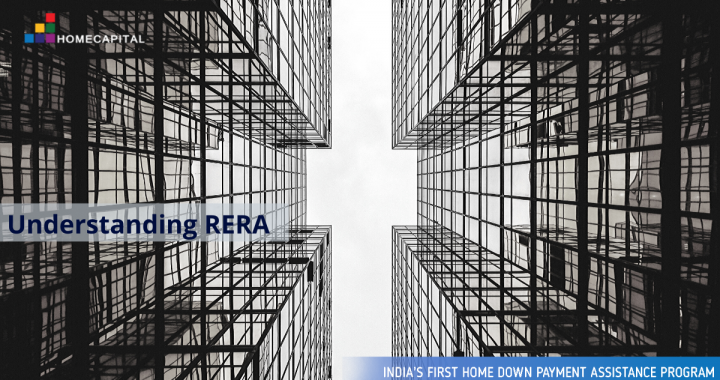Legal Due Diligence
Legal due diligence is a process by which you can minimize the legal risks associated with a real estate transaction before you proceed for home deal closure. It forms the most critical aspect of your home buying process as you put your life savings into it. Neglecting anything in this aspect can lead you into unnecessary litigation or property dispute. It might also lead to losing your ownership rights or paying hefty penalties. Real estate transactions are legally sensitive matters. The true value of your real estate transaction or investment is realized only when you take into account the legal risks associated with it.
Home buyers should not go for home deal closure with the builders/agents without conducting proper legal due diligence on the property of interest. You will need the help of a lawyer or legal expert to perform your due diligence. You should ask your lawyer to create the draft agreement between you and the builder.
HomeCapital has put together a comprehensive checklist of steps necessary to complete your legal due diligence process before the home deal closure. The steps included are as follows:
Chain of Deeds/Title
The first step of your legal due diligence process before you proceed for home deal closure is settling the chain of deeds/title. While purchasing a property, make sure all the historical transfers of the land title are in order and there is no missing link. Your lawyer will conduct searches in the Registrar Office and courts to be sure about the land. You should establish the successive transfer of land ownership since the past 30 years. If you are buying a flat/apartment in a multistorey complex, you can conduct searches to verify that the developer/promoter has clear title of the land on which the structure is built. Ask for the title clearance certificate along with the search report from the builder.
Intimation of Disapproval (IOD)
An IOD is an authorization certificate issued by the local municipal body once the builder has obtained all the required No Objection Certificates (NOCs) separately from various departments and government authorities. The final approval to build is called the Commencement Certificate, which is given only when all the NOCs are obtained and all the IOD conditions met. There are about 40 IOD conditions for the builder to be met. Some of these include the Environment Authority and Airport Authority., If you are buying a unit in an under-construction project, make sure to ask for the copies of the IOD, NOCs and Commencement Certificate to avoid any future problems.
Completion Certificate (CC)
This is a certificate from the local municipal body confirming the completion of the building in accordance with the Building Standards and originally approved plan. You should ask for the CC from the builder once the deadline for the completion as mentioned in Sale Agreement is over.
Occupancy Certificate (OC)
This is the permission to occupy the building for the purpose of living. This certificate is issued by the local municipal body once the developer submits all necessary clearances such as electricity, water, fire and sewerage. You cannot legally occupy your unit for living until and unless the builder has the OC for the same.
Obtaining Possession
Once the building is ready for occupation as notified by the builder, it is your responsibility to check if what you are getting is what was promised during the start of the project before the final home deal closure. There have been instances, where the buyers have felt cheated by the builder as they did not deliver the amenities and features as initially promised or advertised. So, before taking the possession of your home from the builder make sure that you check everything related to your new home be it Project Delivery or Legal Documents.
Any irregularities with the delivery of the project or with the documentation should be flagged with the developer or agent. In case your queries are not resolved by the developer/seller, you can approach your state Real Estate Regulatory Authority (RA) for a timely resolution.
Your checklist before possession is classified into two categories: Project Delivery and Legal Documentation.
Project Delivery
Final Layout
Check if the final delivery is as per the originally planned layout & floor plan mentioned in the project brochure. Measure the dimensions of the rooms, hall, bathrooms, kitchen and balconies among other areas. to see if the actual carpet area is as per the agreements. In case of any major deviations, you can deny the possession and ask for a full refund with interest from the builder. You can approach your state RERA if the builder denies his obligations.
Built Quality
Check if the building and unit walls are properly built without any cracks. Check for any water leakages in the walls. Ensure that your unit adheres to the building standards & safety norms. Check if the door and windows of the house are placed as per the original plan. Ensure that they are of good quality with proper latching & knobs and are working smoothly.
Paint
Check for the quality of paints applied on the walls, wooden surfaces, doors, roofing sheets and so on. Check if the paint is of a good brand and has been applied as per the manufacturer’s recommendations.
Amenities
Check if you are getting all the amenities as promised. Check for the type of amenities you were promised/advertised such as a park, swimming pool, gym and clubhouse, among other facilities along with their quality and size. Flag any misrepresentations with the developer or approach your state RERA.
Electric Connections
Check if all the lights, fans and buttons are working properly. Ensure that all the sockets, plugs and bulb / light holders are properly fitted and connected to the mains supply. Check for any broken wires in the house. Check that all the meters are installed and ensure that they are running properly. In case there is an inverter, check for the supply shift by turning off the main switch. For this purpose, you can hire an electrician. Check if the Miniature Circuit Breaker (MCB) has been installed and is of good quality. The MCB needs to be suitable as per the voltage supply of your home.
Common Facilities
It is a common occurrence that the flats are ready but the common amenities and facilities remain incomplete. The builder insists on giving you the possession and demands 100% payment even if the project remains incomplete. You should avoid doing such a mistake as there is a risk that the project will never be completed. Remember that you are not just paying for your house but for the common facilities as well. You have the right to deny the possession and demand compensation or refund if the project remains incomplete when it comes to common amenities such as lifts.
Kitchen, Bathroom & Sanitation
Check if all the kitchen, bathroom and sanitary fittings are done in a proper way. The number of fittings, quality & brand should be as per the sales agreements. Check the working of all the taps in the house; if they are opening and closing without any leakages. There should not be any leakages and blockages in the fittings. And lastly, ask for the warranty papers of the fittings as most of the trusted brands come with a few years of warranty.
Flooring
Check for the floor of the new flat, if it is as per builder specifications (ceramic, marble or wooden) and does not have cracks. You would need to do a major rework if you ignore the flooring quality. You should check the material and work quality.
Drainage
Check if the water is flowing properly through the drainage system of the house without any clogs in bathrooms, kitchen and balconies. Also, check for any water leakages in the house. Clogs and leakages will lead to seepage in walls, which can be difficult to rectify later.
Obtain All Sets of Keys
Ask for all the sets of keys before possession for a worry-free stay. Some keys might be held by the construction/maintenance agencies. Ensure that you get back those keys as well.
Others
Some builders may promise additional features such as home furnishing and air conditioners (ACs) among others. Check if the ACs have proper water outlets as improper ducting can lead to water seepages in the walls. If you have invested in a home that has digital features such as lighting control, security cameras and temperature control, do check all the equipment to make sure that they are in a perfect working condition.
Legal Documentation Prior to Home Deal Closure
Encumbrance Certificate
A document that has details of all the transactions on the property over a period of time (usually 13-30 years). It is evident that the property in question is free from any monetary or legal liabilities. The certificate confirms that the property has a clear marketable title and will come to you without any financial obligations.
Khata/Patta (Certificate/Extract)
These documents certify that a particular property belongs to a particular person, who is responsible to pay taxes over the property to the local authorities. The documents also contain property details such as name, size, use and value of the property needed to evaluate tax on the same. Khata is used for registering your property, selling the property, availing loan on the property and applying for utilities such as water & electricity connections.
Sale Deed
Also known as Title Deed/ Mother Deed/Conveyance Deed this is a legal document, confirming the sale of property and transfer of ownership. The document establishes the ownership of the property in favour of the buyer and entitles them for further transactions on the property. A Sale Deed will be your main property document that needs to be registered with the Sub Registrar’s Office within 4 months from the date of execution.
Allotment Letter
A document issued by the developer, Co-operative Society, Housing Board or the Regional Development Authority required by the banks / Housing Finance Companies (HFCs) for the disbursal of your home loan. The document is proof that a certain property has been allocated to the buyer upon the payment of initial funds. The document contains the details like the amount paid, the amount due, the property details and project specifications on the basis of which the banks / HFCs will release the funds as a loan.
Possession Certificate Copy
A document issued by the developer to the home buyer that confirms that the possession of the house is being delivered to the home buyer on a specific date mentioned in the document. The document is essential to get tax deductions. By accepting the possession certificate, you confirm that the final product is delivered in a good condition as initially promised and that there is no major re-work. Do not accept the possession if you are not fully satisfied with the final product. If you notice any shortcomings in the delivery, you can deny the possession or accept conditional possession.
Tripartite Agreement
It is an agreement between the buyer, the builder and the bank/HFC in case one goes for a home loan in an under-construction project. Such an agreement is made because the owner of the flat/apartment lies with the builder until the date of possession. The agreement ensures that the builder has a clear title over the land and makes them liable to complete the project on time as per the actual plan.
The agreement bars the builder from entering into any other agreements over the said property with any other party. It makes the buyer liable to pay the EMIs as per mortgage agreement even if the builder delays or fails to deliver the flat on time or in case of any disputes between the buyer and the builder. In case of a default in repayment by the borrower or in case the deal between the borrower and the builder gets cancelled for any reason, the builder has to refund all the money back to the bank.
Maintenance Service Agreements (MSA)
An agreement between the builder and buyer where the builder agrees to provide and maintain essential services on reasonable maintenance charges to be paid by the residents. Most buyers don’t pay heed to maintenance charges initially but later feel the burden as the possession nears.
Once the society’s Resident Welfare Association (RWA) is formed, and the maintenance work is handed over to it, the builder can no longer charge for maintenance. The RWA can then devise its own set of rules for maintenance charges.
No Dues Certificate
It is given by the builder, once you make all the balance payments and pay all the charges as mentioned in the sales agreement. It is to be noted that the builder will not grant you the possession of your flat until and unless you clear all your dues as per sales agreements.
Joint Development Agreement
Joint Development Agreement comes into picture when the builder develops on the land owned by a third party. The landowners pool their land as a resource and the builder bears the cost of construction. If you are buying property in such an arrangement, make sure to ask for a copy of the Joint Development Agreement registered in the sub-registrar’s office.
Make sure who has the marketing rights over the flat/apartment you are purchasing, the landowner or the builder. You can ask for a NOC from the other party or execute a tripartite agreement involving yourself, the builder and the landowner prior to home deal closure process.








